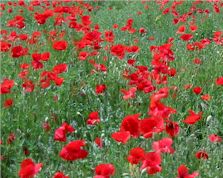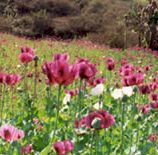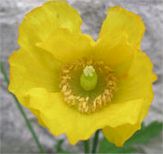|

Scarlet Poppy |
The Scarlet Poppy of our cornfields (Papaver Rhoeas) is one of the most brilliant and familiar of English wild flowers, being strikingly conspicuous as a weed by its blossoms rich in scarlet petals, which are black at the base. The title "Papaver" has been derived from pap, a soft food given to young infants, in which it was at one time customary to boil Poppy seeds for the purpose of inducing sleep. Provincially this plant bears the titles of "Cop Rose" (from its rose-like
flowers, and the button-like form of its cop, or capsule) and "Canker Rose," from its detriment to wheat crops.
|
The generic term "Rhoeas" comes from reo, to fall, because the scarlet petals have so fragile a hold on their receptacles; and the plant has been endowed with the sobriquet, "John Silver Pin, fair without and foul within." In the Eastern counties of England any article of finery brought out only occasionally, and worn with ostentation by a person otherwise a slattern, is called "Joan Silver Pin." After this sense the appellation has been applied to the Scarlet Poppy.
Its showy flower is so attractive to the eye, whilst its inner juice is noxious, and stains the hands of those who thoughtlessly crush it with their fingers.
"And Poppies a sanguine mantle spread, For the blood of the dragon St. Margaret shed."
Robert Turner naively says, "The Red Poppy Flower (Papaver erraticum) resembleth at its bottom the settling of the 'Blood in pleurisie'"; and, he adds, "how excellent is that flower in diseases of the pleurisie with similar surfeits hath been sufficiently experienced."
It is further called Blindy Buff, Blind Eyes, Headwarke, and Headache, from the stupefying effects of smelling it. Apothecaries make a syrup of a splendid deep color from its vividly red petals; but this does not exercise any soporific action like that concocted from the white Poppy, which is a sort of modified opiate, suitable for infants under certain conditions, when sanctioned by a doctor. Otherwise, all sedatives of a narcotic sort are to be strongly condemned for use by
mothers, or nurses:
"But a child that bids the world 'Good-night'
In downright earnest, and cuts it quite,
(A cherub no art can copy),
'Tis a perfect picture to see him lie,
As if he had supped on dormouse pie,
An ancient classical dish, by-the-bye,
With a sauce of syrup of Poppy."
Petronius, in the time of Nero, A.D. 80, "delivered an odd receipt for dressing dormouse sausages, and serving them up with Poppies and honey, which must have been a very soporiferous dainty, and as good as owl pye to such as want a nap after dinner."
|

White Poppy |
The white Poppy is specially cultivated in Britain for the sake of its seed capsules, which possess attributes similar to opium, but of a weaker strength. These capsules are commonly known as Poppyheads, obtained from the druggist for use in domestic fomentations to allay pain. Also from the capsules, without their seeds, is made the customary syrup of White Poppies, which is so familiar as a sedative for
childhood; but it should be always remembered that infants of tender years are highly susceptible to the influence even of this mild form of opium. The true gum opium, and laudanum, which is its tincture, are derived from Eastern Poppies (Papaver somniferum) by incisions made in the capsules at a proper |
season of the year. The cultivated Poppy of the garden will afford English opium in a like manner, but it is seldom used for this purpose. A milky juice exudes when the capsules of these cultivated flowers are cut, or bruised. They are familiar to most children as drumsticks, plucked in the garden after the gaudy petals of the flowers have fallen off. The leaves and stems likewise afford some of the same juice, which, when inspissated, is known as English opium. The seeds of
the white Poppy yield by expression a bland nutritive oil, which may be substituted for that of olives, or sweet almonds, in cooking, and for similar uses. Dried Poppy-heads, formerly in constant request for making hot soothing stupes, or for application directly to a part in pain, are now superseded for the most part by the many modern liquid preparations of opium handy for the purpose, to be mixed with hot water, or applied in poultices.
For outward use laudanum may be safely added to stupes, hot or cold, a teaspoonful being usually sufficient for the purpose, or perhaps two, if the pain is severe; and powdered opium may be incorporated with one or another ointment for a similar object. If a decoction of Poppy capsules is still preferred, it should be made by adding to a quarter-of-a-pound of white Poppy heads (free from seeds, and broken up in a mortar) three pints of boiling water; then boil for ten or
fifteen minutes, and strain off the decoction, which should measure about two pints.
Dr. Herbert Snow, resident physician at the Brompton Cancer Hospital, says (1895) he has found: "after a long experience, Opium exhibits a strong inhibitive influence on the cancer elements, retarding and checking the cell growth, which is a main feature of the disease. Even when no surgical operation has been performed, Opium is the only drug which markedly checks cancer growth: and the early employment of this medicine will usually add years of comfortable life to the
otherwise shortened space of the sufferer's existence." Opium gets its name from the Greek apos, juice.
The seeds of the white Poppy are known us mawseed, or balewort, and are given as food to singing birds. In old Egypt these seeds were mixed with flour and honey, and made into cakes.
Pliny says: "The rustical peasants of Greece glazed the upper crust of their loaves with yolks of eggs, and then bestrewed them with Poppy seeds," thus showing that the seeds were then considered free from narcotic properties. And in Queen Elizabeth's time these seeds were strewn over confectionery, whilst the oil expressed from them was "delightful to be eaten when taken with bread."
White Poppy capsules, when dried, furnish papaverine and narcotine, with some mucilage, and a little waxy matter. The seeds contained within the capsules yield Poppy seed oil, with a fixed oil, and a very small quantity of morphia--about five grains in a pound of white Poppy seeds. In some parts of Russia the seeds are put into soups.
The Poppy was cultivated by the Greeks before the time of Hippocrates. It has long been a symbol of death, because sending persons to sleep. Ovid says, concerning the Cave of Somnus:
"Around whose entry nodding Poppies grow,
And all cool Simples that sweet rest bestow."
The common scarlet Poppy was called by the Anglo-Saxons "Chesebolle," "Chebole," or "Chybolle," from the ripe capsule resembling a round cheese.
|

Welsh Poppy |
There is a Welsh Poppy, with yellow flowers; and a horned Poppy, named after Glaucus, common on our sea coasts, with sea-green leaves, and large blossoms of golden yellow. Glaucus, a fisherman of Boeotia, observed that all the fishes which he caught received fresh vigour when laid on the ground, and were immediately able to leap back into the sea. He attributed these effects to some herb growing in the
grass, and upon tasting the leaves of the Sea Poppy he found himself suddenly moved with an intense desire to live in the sea; wherefore he was made a sea-god by Oceanus and Tethys. Borlase says: "That in the Scilly Islands the root of the Sea Poppy is so much valued for removing all pains in the |
breast, stomach, and intestines, as well as so good for disordered lungs, whilst so much better there than in other places, that the apothecaries of Cornwall send thither for it; and some persons plant these roots in their gardens in Cornwall, and will not part with them under sixpence a root." The scarlet petals of the wild Poppy, very abundant in English cornfields, when treated with sulphuric acid make a splendid red dye. With gorgeous tapestry cut from these crimson
petals, the clever "drapery bee" (Apis papaveris) upholsters the walls of her solitary cell. Bruised leaves of the wild, or the garden Poppy, if applied to a part which has been stung by a bee or a wasp, will give prompt relief.
Herb Simples
The Primitive Simplers presented here show the way of life in other generations, it is not suggested or recommended trying them yourself. |
|
Garden
Herbs
Home
History of Herbs
Herb Gardening
Herbs for Beginners
Drying & Preserving Herbs
Indoor Herb Gardening
Herb Garden
Hints & Tips
Herbal
Cooking
Herb Chart
Using Herbs
Culinary Herbs
Herb
Oil and Vinegar
Herb Teas
Herb Candy
Herb Jelly
Herb Simples
Preface
Introduction
Alphabetical Listing

Trade
Recipes Online
Share your Recipes with others!!
|




